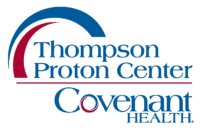Proton therapy for esophageal cancer
- Maintains quality of life
- Lower risk of side effects
- Decreased impact on surrounding tissue
- Reduced radiation exposure
- Controlled placement & dosage
- Treatment of complex tumors
- Treatment near sensitive organs
Precise Cancer Treatment
Cancer Treatment that allows patients to maintain their quality of life by reducing risks of side effects.
Receiving your esophageal cancer diagnosis can be an emotional experience, but there is much hope. Advances in treatment options and protocols means we’re able to offer exceptionally effective cancer treatment that substantially improves outcomes for adults while simultaneously ensuring minimal side effects due to the ultra-precise nature of proton therapy.
Proton therapy is an advanced and well-established radiation treatment method for treating solid tumors and cancers. Proton Therapy is far superior to traditional radiation therapy due to it’s ability to deliver the desired amount of radiation to a tumor without simultaneously irradiating the surrounding healthy tissue. Proton therapy’s precision allows oncologists to ensure the radiation dose stops precisely at the far edge of the tumor thus producing a very low exit dose. This is called the Bragg-Peak. This greatly reduces unnecessary radiation resulting in fewer treatment-related side effects.
A care coordinator will contact you by phone during normal business hours.
Proton Therapy for Esophageal Cancer
Precise Cancer Treatment
Cancer Treatment that allows patients to maintain their quality of life by reducing risks of side effects.
Receiving your esophageal cancer diagnosis can be an emotional experience, but there is much hope. Advances in treatment options and protocols means we’re able to offer exceptionally effective cancer treatment that substantially improves outcomes for adults while simultaneously ensuring minimal side effects due to the ultra-precise nature of proton therapy.
Proton therapy is an advanced and well-established radiation treatment method for treating solid tumors and cancers. Proton Therapy is far superior to traditional radiation therapy due to it’s ability to deliver the desired amount of radiation to a tumor without simultaneously irradiating the surrounding healthy tissue. Proton therapy’s precision allows oncologists to ensure the radiation dose stops precisely at the far edge of the tumor thus producing a very low exit dose. This is called the Bragg-Peak. This greatly reduces unnecessary radiation resulting in fewer treatment-related side effects.
A care coordinator will contact you by phone during normal business hours.
Proton Therapy for Esophageal Cancer

How Proton Therapy works
Proton Therapy is delivered using a purpose-built machine called a cyclotron or synchrotron that accelerates proton particles directly to a tumor or other areas of concern for microscopic tumors.
Traditional radiation therapy delivers photons or x-rays that pass through the body to the tumor site while continuing on though healthy tissue to finally exit the body. This unfortunately causes healthy tissue to be irradiated in the process of treatment causing adverse side effects including potentially new tumors.
Proton Therapy is far superior to traditional radiation therapy due to its ability to be manipulated so precisely that the desired radiation dose can be delivered while ensuring it stops at the far side of the tumor site.
The unique and ultra-precise delivery property of protons is known as the Bragg-Peak (pictured below). In essence, with Proton Therapy technology, we can deliver the desired radiation dose to the tumor with virtually no radiation reaching the surround healthy tissues.
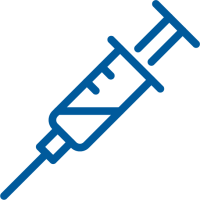
Why Proton Therapy is ideal for esophageal cancer patients
Due to the esophagus’ proximity to critical organs such as the stomach, lungs, heart, and certain lymph nodes, patients see far better outcomes and fewer adverse side effects with Proton Therapy due to it’s ability to precisely deliver radiation to a tumor.
Due to it’s precision, Proton Therapy delivers less radiation to the heart, lungs, and other upper abdomen structures. Less radiation to these critical organs reduces the likelihood that patients will experience adverse effects during or even years after treatment.
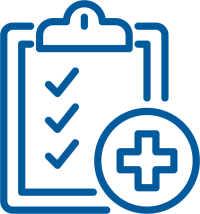
Drastically reducing likelihood of adverse side effects
In treatment of esophageal cancers, Proton Therapy can reduce or avoid radiation to surrounding healthy tissue and organs thus greatly reducing the likelihood of adverse side effects.
Depending on the tumor location and type, Proton Therapy may achieve the following benefits:
- Reduced risk of inflammation of the heart (pericarditis) and future heart problems like hardening of the arteries (atherosclerosis), stiffening of the heart muscle (fibrosis, cardiomyopathy), and heart attacks.
- Reduced risk of inflammation of the lungs (radiation pneumonitis), and problems with lung function (lung fibrosis).
- Reduced risk of nausea and diarrhea.
- Reduced radiation to the bone marrow and circulating lymphocytes, which may help support the function of the immune system in fighting cancer.
- Reduced risk of low blood counts (anemia, neutropenia) which may support the body’s tolerance of chemotherapy.
- Reduced risk for younger patients with a good prognosis and a long life expectancy and patients with genetic predispositions for being at higher risk for developing other cancers.
Stories of Strength
An Esophageal Cancer Survivor's Story
Esophageal cancer is a disease where abnormal cells grow in an uncontrolled manner within the esophagus. The esophagus is a tubular, elongated organ that connects the throat with the stomach and transports liquids and food to the stomach. The esophagus is made up of three primary tissue types. Mucous membranes, muscle, and connective tissues.
Esophageal cancer typically originates within the lining of the esophagus and grows throughout the surrounding tissue. There are 2 common forms of esophageal cancer which are named for the types of cells that become cancerous:
- Squamous cell carcinoma which forms in the thin, flat cells lining the esophagus. It typically originates in the upper to middle section of the esophagus but can occur anywhere.
- Adenocarcinoma is a cancer that originates in the cells that produce mucus. These type of cancer typically starts far lower in the esophagus close to the stomach.


We have answers to your questions
Typically, there is no pain, discomfort, or sensation during the actual radiation treatment. Fortunately, most patients have few, if any any mild side effects from proton therapy. These can easily be managed with medication in most cases.
The actual treatment process only lasts about one minute but the entire cancer treatment session can range from 20 minutes to 90 minutes depending on the patient’s needs and case.
Due to the mild and precise nature of proton therapy, patients are able to participate in normal life and activities before and after treatment.
Our care coordinators are happy to share more. Please call or reach out to us using the contact form.
Yes! There are many American and international clinical studies that prove the effectiveness of Proton Therapy including the three studies mentioned below on this page. We’re happy to provide even more information, please reach out to us and we’ll be happy to share more.
Yes! Of course, each case is different and a treatment plan customized to meet the patient’s needs must be implemented but Proton Therapy can be used in conjunction with conventional radiation, chemotherapy, hormone therapy, and/or as a follow-up to surgery.
Yes! Many private insurance companies in addition to Medicare and state Medicaid programs cover Proton Therapy. We understand you have many questions regarding not only treatment but also cost. Our financial coordinators are here to help you understand your insurance coverage, your own out-of-pocket costs, and even help find alternative financing options if needed.
Not at all! Proton therapy was approved by the U.S. Food and Drug Administration 36 years ago in 1988. To date, there have been more than 105,000 patients treated with Proton Therapy worldwide. This makes Proton Therapy a widely trusted and proven treatment option.
Cancer treatment with protons compared to treatment with conventional radiation/X-rays/IMRT
Protons can be controlled with greater precision than X-rays. This means that more energy goes into destroying the tumor and less radiation is delivered to surrounding healthy tissue.
For this reason, proton therapy is particularly good for treating tumors near healthy organs, including esophageal tumors.
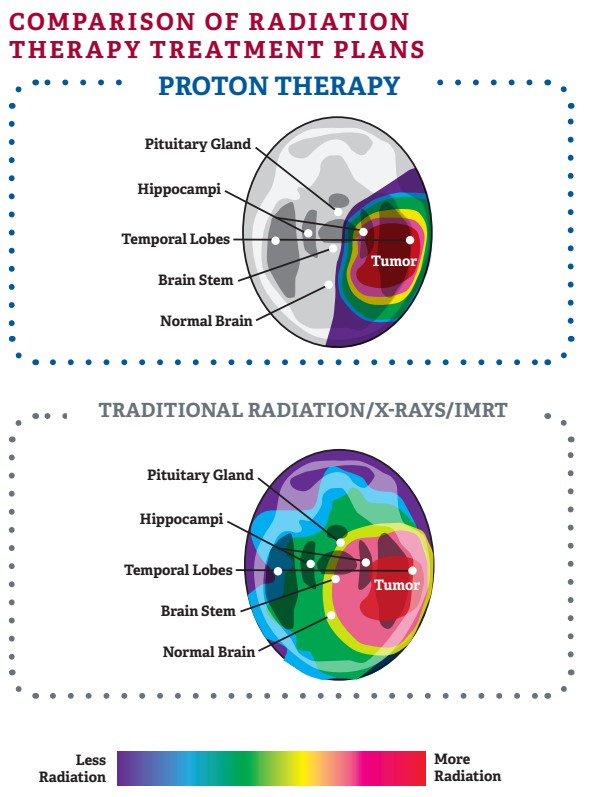
What is proton therapy?
Proton therapy uses charged particles (protons) rather than x-rays to selectively destroy cancer cells. This results in excellent rates of cancer control with a much lower risk of side effects compared with other forms of radiation therapy.
What makes proton therapy different?
Proton therapy is a highly advanced and extremely precise form of radiation. The physical properties of protons, described by the Bragg-Peak (Figure 1 down below), and the increased conformality of pencil beam scanning make it possible to spare healthy surrounding organs from unnecessary radiation exposure during treatment.
Why is this important?
When treating breast cancer with proton therapy, surrounding tissue and vital organs such as the heart and lungs are exposed to far less radiation than standard therapy. Therefore, people treated with proton therapy experience fewer side effects and an improved quality of life during and after treatment.
Is proton therapy effective?
Yes! Many clinical studies have demonstrated the effectiveness of proton therapy for treating many types of cancer.
Less radiation, better quality of life
Proton therapy deposits less radiation dose before reaching the tumor, then deposits the prescribed dose within the tumor, and has no exit dose.
X-ray radiation must start with a higher dose that gradually declines to the prescription dose at the tumor, then continues to deposit radiation in healthy surrounding tissue as it exits the body.

Committed to our cause since 1985
The Thompson Cancer Survival Center Story
World-Class treatment, right in Knoxville, TN
Thompson Proton Center is one of less than 50 proton centers in the entire world. And, we’re proud to be members of Thompson Cancer Survival Center, where leading cancer specialists use the most advanced technologies and treatment methods to achieve breakthrough successes. Our network of cancer care providers are supported by a team of patient navigators, oncology pharmacists, dietitians, genetics counselors, clinical trials experts, physicists, therapists, technologists, and nurses with one goal: to treat and beat your cancer.
Our leading oncologists
You’re in good hands with Thompson Proton Center

Radiation Oncologist
and Medical Director
Ryan Grover, MD
Residency:
Radiation Oncology
Loma Linda University Medical Center
Medical School:
University of Southern California

Radiation Oncologist
Brion Shin, MD
Residency:
Radiation Oncology
Loma Linda University Medical Center
Medical School:
Loma Linda University Medical Center
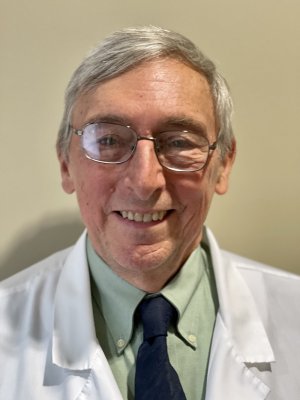
Radiation Oncologist
Allen Meek, MD
Residency:
Radiation Oncology
Johns Hopkins University
Medical School:
Johns Hopkins University
- Fill in our quick form
- A care coordinator will contact you by phone during normal business hours.
- We’ll take the time to listen and plan the next steps
A care coordinator will contact you by phone during normal business hours.

